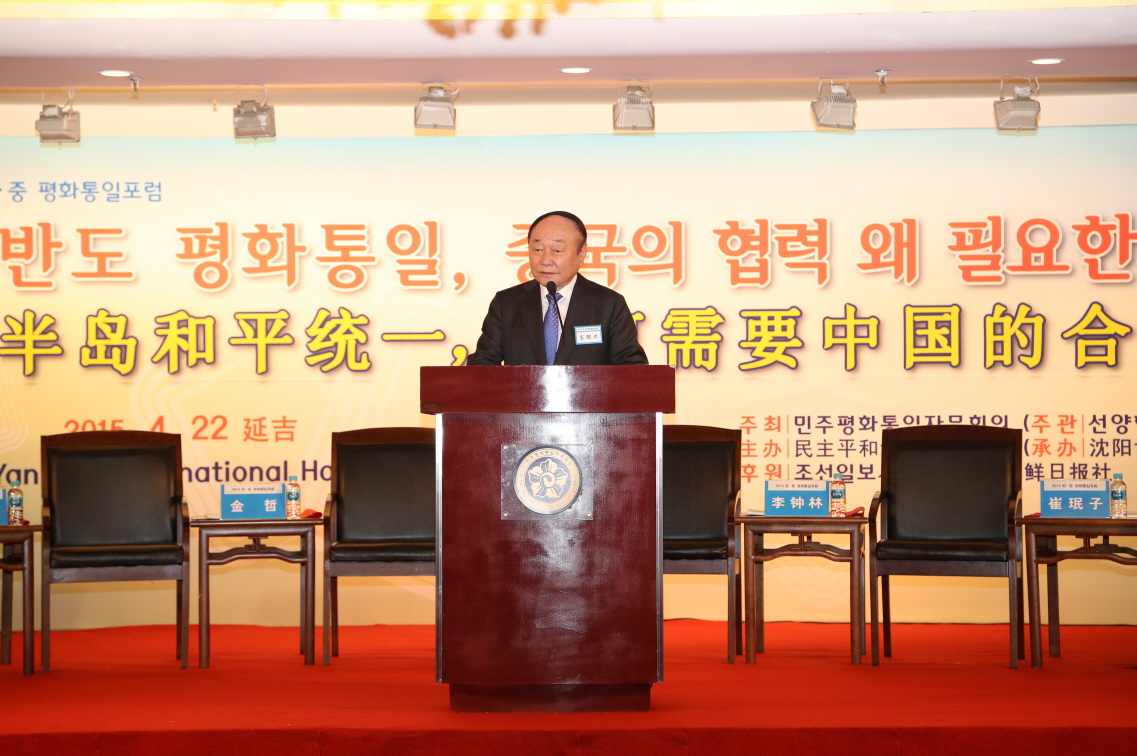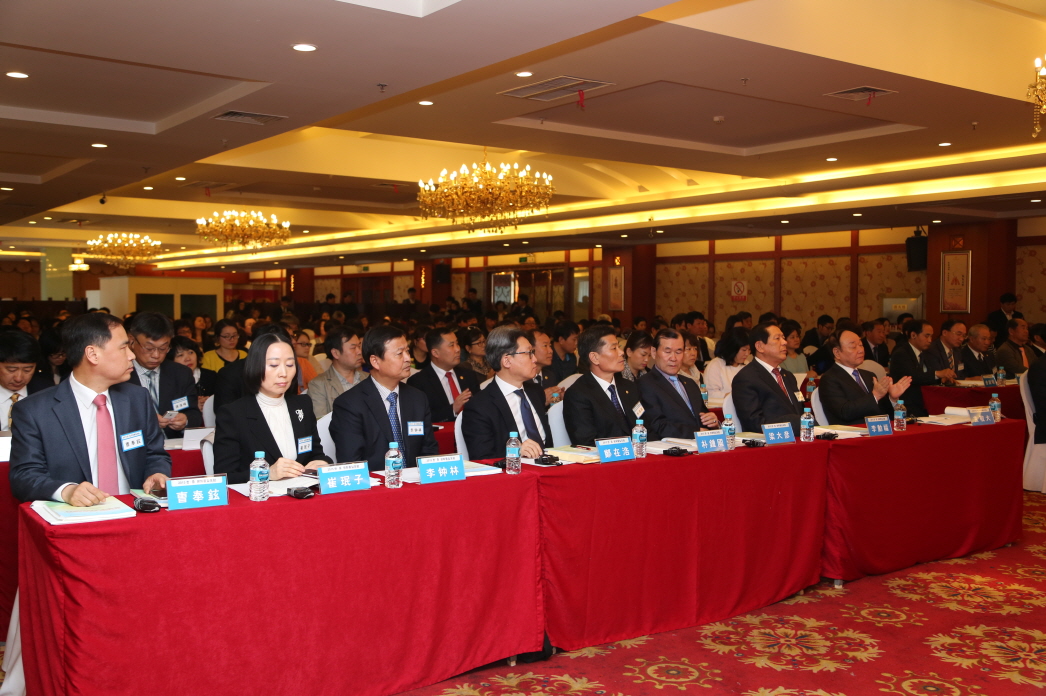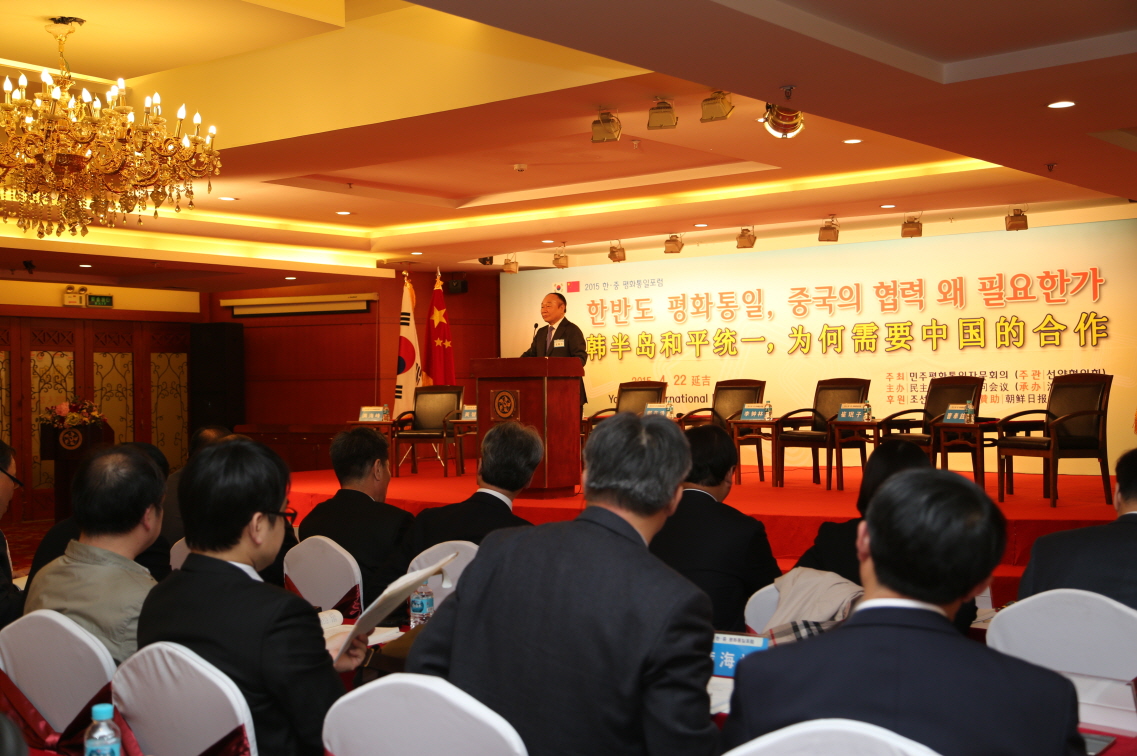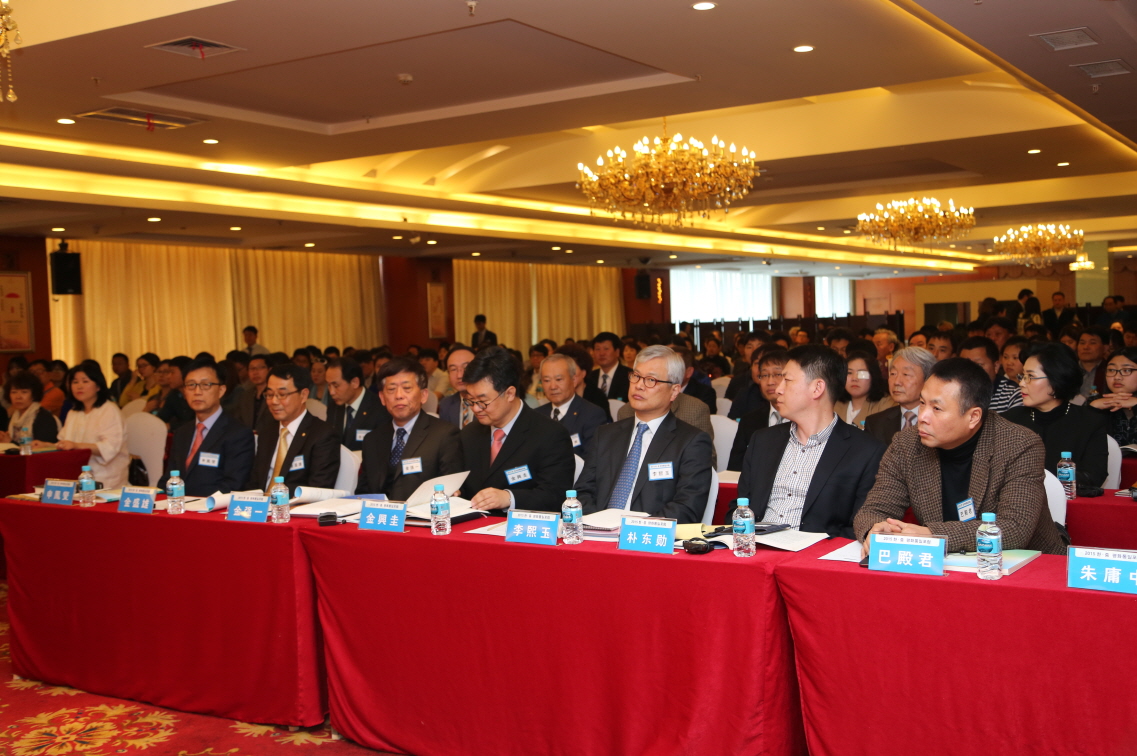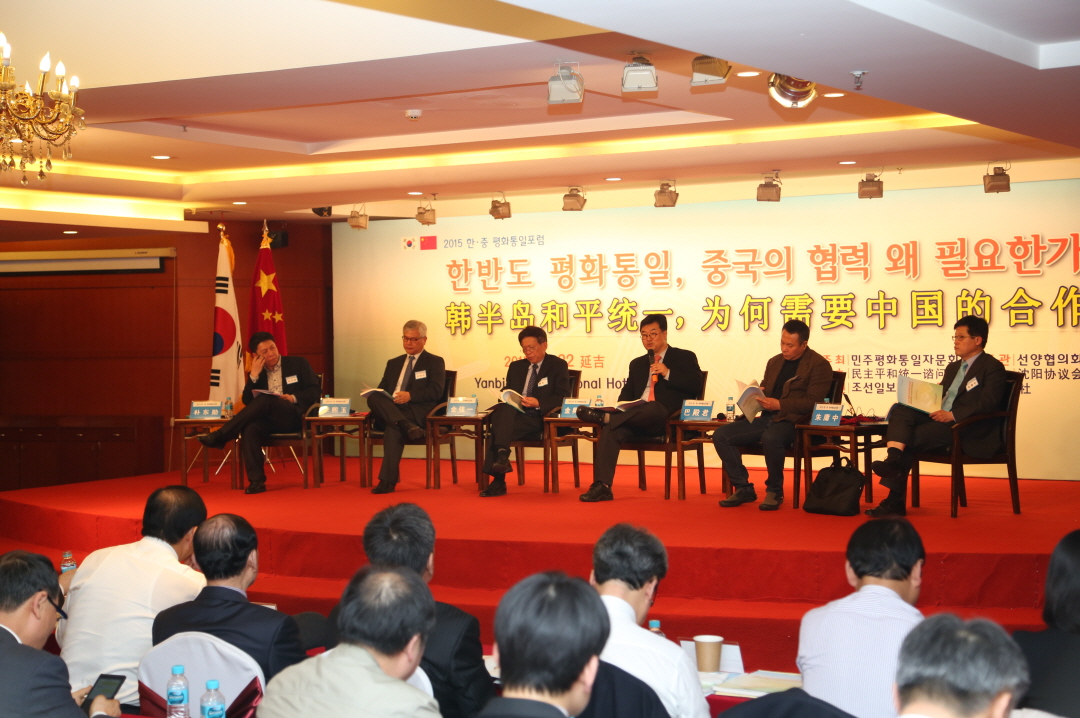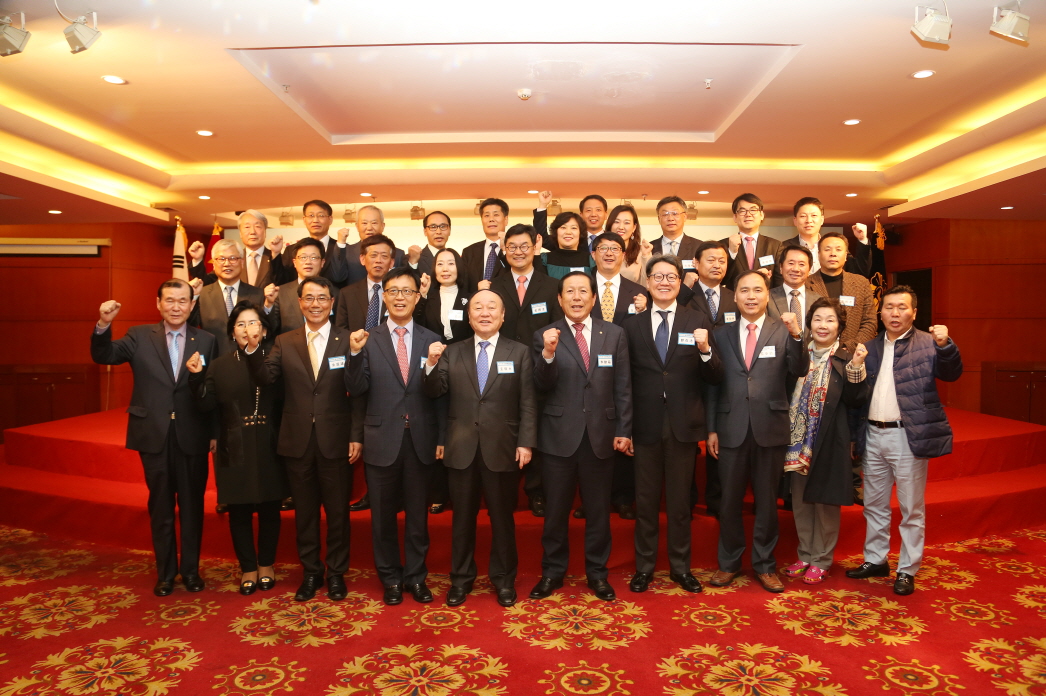| 在中国延吉召开2015年韩中和平统一论坛 |
|---|
| 海外地区科, 2015-04-28 |
2015 Korea-China Peaceful Unification Forum
Held in Yenji, China under the theme of “Peaceful Unification of the Korean Peninsula and Roles of China”
Held in Yenji, China under the theme of “Peaceful Unification of the Korean Peninsula and Roles of China”
The 2015 Korea-China Peaceful Unification Forum was held on 22 April in Yenji, Yanbian Korean Autonomous Province of China to discuss the two neighbouring countries’ methods of achieving unification on the Korean Peninsula amid the complicated, diversified political situation in Northeast Asia and form a bond of sympathy on the inter-Korean policy of the South Korean government in the local communities in China.
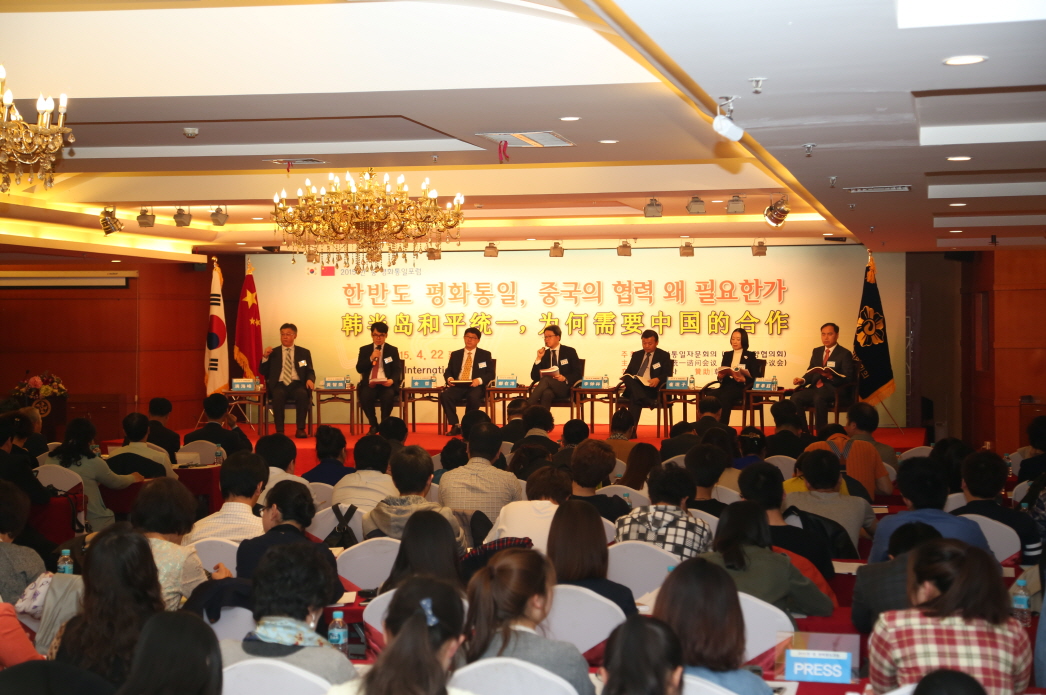
Korea – China Forum
The forum was organized by the Shenyang Municipal Chapter, China of NUAC, sponsored by the Chosun Ilbo of Korea, and attended by 260 experts in various fields, local NUAC members, leaders of Korean society in the area, and students and professors of Yanbian University and Yanbian University of Science & Technology.
A total of 13 experts from Korea and China discussed the subject “Why the cooperation of China is required for the peaceful unification of the Korean Peninsula” and exchanged views on the various issues of politics, economy, and international relations including △ the changing situation in the Korean Peninsula – evaluation and prospects and △ Unification of the Korean Peninsula and Sino-Korea Relations – Direction and Subject.
Opening Ceremony
The forum ran for 5 hours from 1 pm to 6 pm, starting with an opening speech by Kim Sung-woong, head of the Shenyang Municipal Chapter. This was followed by congratulatory addresses by Shin Bong-sup, Korean Consul General to Shenyang, China, Lee Hun-bok, Vice-chairperson of the China Assembly of NUAC, and Prof. Jin Chang-yi from Yanbian Univ. Hyun Kyung-dae, Executive Vice-chairperson of NUAC, gave the key note address.
Hyun delivered his key note address titled “Development of North Korea and Unification of the Korean Peninsula – Cooperation between Korea and China” and explained the change of North Korea and roles of China in achieving the unification of the two Koreas.
Hyun noted that holding a forum on the peaceful unification of Korea here in Yenji, China -- where the Korean Peninsula meets the Chinese Continent -- is very meaningful on the occasion of the 70th Anniversary of Independence and Division of the Korean Peninsula this year. Korea and China should secure the prosperity and future of Northeast Asia through peace and cooperation by looking back at the past 7 decades, he added.
“The overall renovation and open policy promoted by China have become a good example of the old communist regime including Russia and East European block. North Korea can no longer ignore renovation and openness; if Pyeongyang chooses openness and renovation policy, the North Korean economy can record growth rates of as high as 15% per annum,” Hyun explained.
According to him, President Park Geun-hye suggested the process of expanding peace and cooperation across South and North Korea, Northeast Asia, and Eurasia on the basis of mutual trust through the trust build process of the Korean Peninsula, Peace Cooperative Plan of Northeast Asia, and Eurasia Initiative. Such suggestion has been supported by every country in the world, he stressed.
“Considering the reality that more than 90% of the external trade of North Korea is dependent on China, the role of China is instrumental in realizing the development of North Korea and unification of the two Koreas. In this regard, overseas Koreans living in the northeastern part of China are in the best position to communicate with South and North Korea and China. We hope they will play the role of bridging the three parties,” Hyun added.
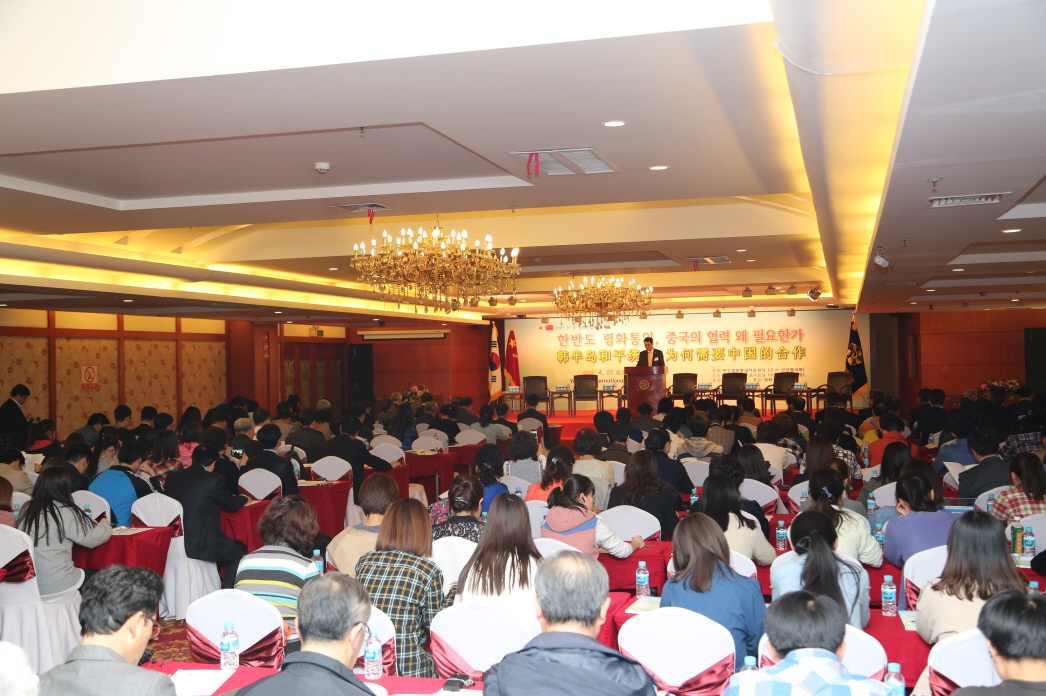
Kim Sung-woong, Head of the Shenyang Municipal Chapter of NUAC
Kim said in his opening speech that the remarkable economic growth of China, which maintains socialism, makes the country a world leader at present, and that its close and positive cooperation is absolutely required for unifying the Korean Peninsula. To draw Chinese cooperation, we need to demonstrate our firm will toward unification, he added.
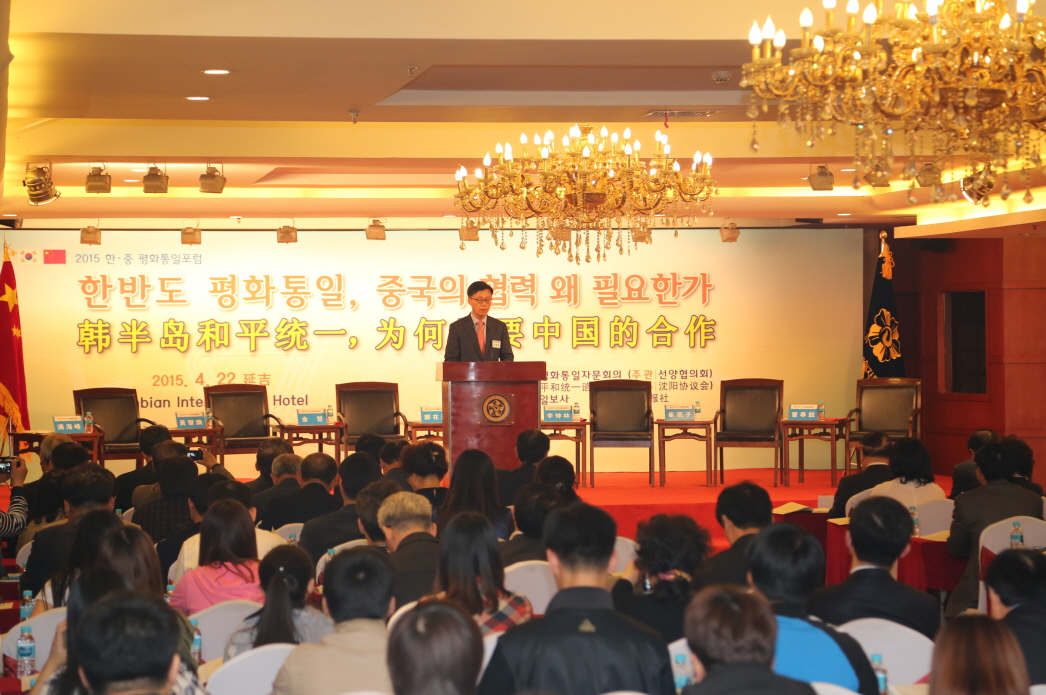
Shin Bong-sup, Korean Consul General to Shenyang, China
“The unification of the Korean Peninsula and the relationship between South Korea and China cannot be separated and South Korea and China share close and multi-layer interests with each other. The Chinese government is giving shape to its “One Band, One Road” scheme, and Beijing is accelerating economic reform of the three provinces in the northeast region of the country and gearing up its opening policy based on a new promotion strategy of the Northeast Asian region. Since the AIIB (Asia Infrastructure Investment Bank) initiated by China is inclusive of our scheme for Northeast Asia Development Bank, close cooperation between South Korea and China is essential for opening North Korea and developing its infrastructures as well,” Shin explained.
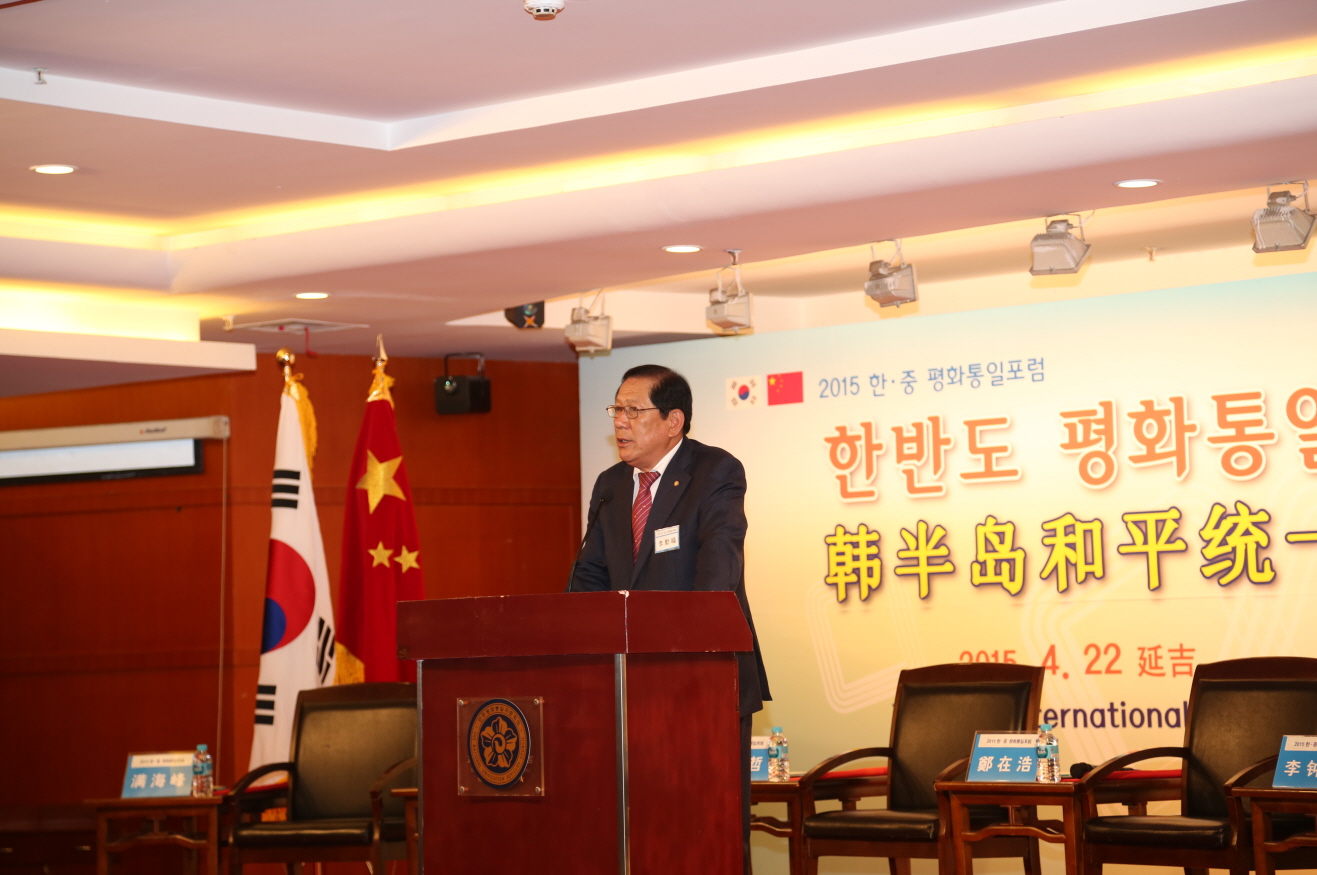
Lee Hun-bok, Vice-chairperson of the China Assembly of NUAC
According to Lee, holding a peaceful unification forum in Beijing in 2013, in Shanghai in 2014, and in Yenji this year is very meaningful in many aspects.
“Since elements of cooperation as well as conflict exist between China and Korea as two geographically adjacent countries, we need an opportunity to communicate with and understand each other. In this regard, we should meet in an event such as a peaceful unification forum for unifying the two Koreas,” Prof. Jin Chang-yi of Yanbian Univ. said in his congratulatory address.
1st Session: Situation Change in the Korean Peninsula – Evaluation and Prospects
Prof. Chung Jae-ho of Seoul National Univ., who is also the director of the US- China Relations Research Center, presided over the first session themed “Situation Change in the Korean Peninsula – Evaluation and Prospects.” Serving as panellists were Prof. Hwang Ji-hwan of University of Seoul, Man Haifeng, director of the Northeast Asia Research Center of the Liaoning Social Science Institute, Cho Bong-hyun, senior researcher of the IBK Economy Research Institute, Lee Jung-lin, director of the Economy Administration Institute of Yanbian Univ., and Prof. Choi Min-ja, Dean of College of Social Sciences of Sungshin Women’s Univ.
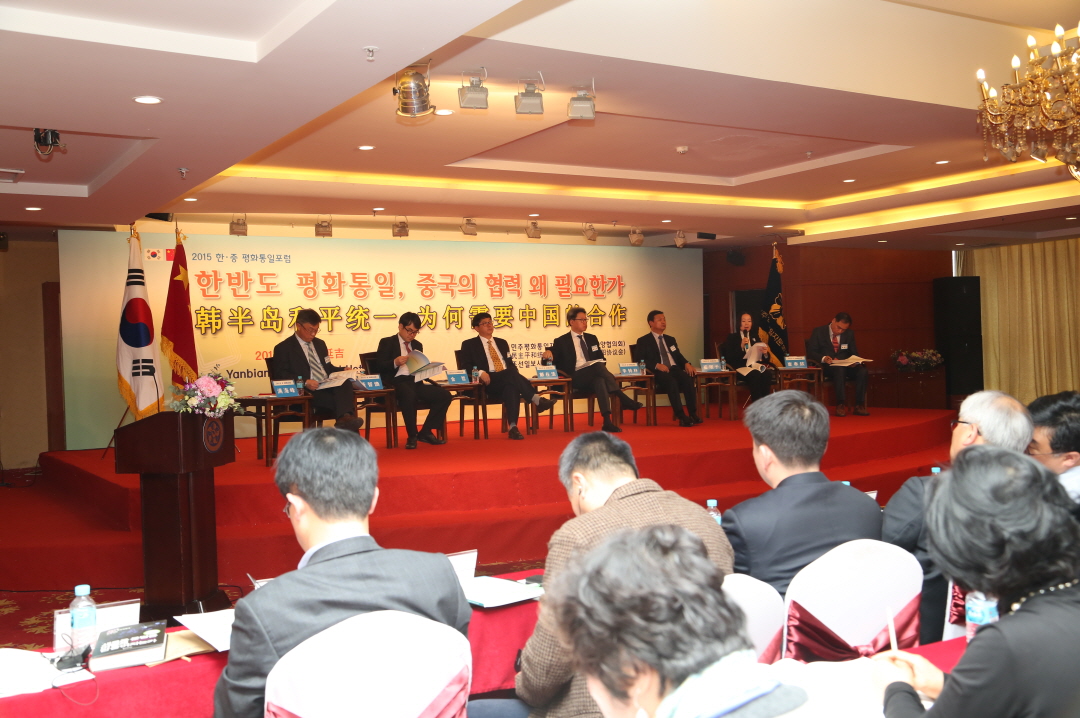
1st Session
The session started with a discussion on the current political situation of the Korean Peninsula.
“The US government does not regard the North Korean issue as one of the most important agenda, but its stance of restricting North Korea will be much harder. North Korea tries to get out of external isolation by improving relations with Japan and Russia, but Pyeongyang is eventually focused on the US-North Korean relations. Note, however, that American hard-liners against North Korea are increasing again under the current situation, and such may result in worsening inter-Korean relations,” Prof. Hwang explained.
According to him, inter-Korean relations should change for South Korea to be able to perform a pivotal role during the course of unification of the Korean Peninsula under the current situation. Therefore, the South Korean government needs to lead the fostering of such relations more positively, he said. He went on to add that the unification cost will increase further without improved inter-Korean relations, and that stabilizing and systemizing such relations are consequently essential from a long-term perspective during the course of preparing for national unification.
“The most serious obstacles affecting Sino-North Korean relations are the external issue and zero-sum relations between the two Koreas, and the coexistence of unique characteristics and normality between Beijing and Pyeongyang would continue for the time being. The ‘One Band, One Road’ strategy scheme of China and establishment of AIIB by China may provide a broad cooperation platform and a venue for unlimited development to the tripartite relations among the two Koreas and China,” said Jin Juh, Director of the Liaoning Social Science Institute.
Following the analysis of the current situation, the economic issue as the core topic of the forum was raised.
Man Haifeng, director of the Korean Peninsula Research Institute of Liaoning Academy, analyzed and explained the following issues: △ The traditional planned economy of North Korea has come loose after the North Korean regime tried to move toward economic reform; △ North Korea’s coordinates production model of group management system in the agricultural area; △ Business management rights are transferred to a company from the central government; △ Market control is eased; △ People’s interest in and demand for a new product are increasing.
According to him, realizing the adjustment of Chinese strategy for the Korean Peninsula requires organizing an economic trade bloc among China and South and North Korea in keeping with the ‘One Band, One Road’ strategy of China, serving as a cornerstone for China to maintain its strategic influence over the Korean Peninsula.
“North Korea is promoting an economic development area through economic reform and inviting foreign investment to find a breakthrough to revive its poor economy. South Korea and China are the very partners to cooperate with North Korea, and the mutual interest of the Chinese strategy to develop three northern provinces corresponds with the desperate need of North Korea to recover from its economic difficulties to some extent,” stressed Cho Bong-hyun, senior researcher of the IBK Economy Research Institute. He suggested establishing a “Smile Economic Belt of Korean Peninsula” wherein South and North Korea and China will build an international economic development belt to be a new hub of economic growth in the Northeast Asian region.
Cho added that, after AIIB is established, its first business model should be investment in the social infrastructure of North Korea and cited the need to continue dialogues and establish an organization for it.
Lee Jung-lin, director of the Economy Management Academy of Yanbian University, presented the current status and prospects of developing Tumen River.
Lee cited several factors that restrict the Tumen River development: △ different systems of the countries surrounding Tumen River; △ limits of the local governments along the resin of Tumen River as a subject role of development, and; △ vulnerable economic foundation of the areas along the river.
“The Tumen River areas affect the economic development of the surrounding countries positively and North Korea in particular is influenced the most. The development of the areas can interact with the Far East Development Plan of Russia, East Sea Development Scheme of South Korea, and development plans of Mongolia and Japan. It will surely wield a positive effect on the development of each country,” he explained.
According to Choi Min-ja, Dean of College of Social Sciences of Sungshin Women’s Univ. of South Korea, the global trend is to unify the block economy by region, but Northeast Asia stands still because of national security and history issues. “I would like to suggest building a UN ecology peace park along Tumen River and establishing an economic cooperation zone that allows entry/exit without visa and common currency in the areas based on an agreement with North Korea, China, and Russia,” he added.
2nd Session: Unification of the Korean Peninsula and Sino-Korean Relations: Direction and Subject
The second session, titled “Unification of the Korean Peninsula – Direction and Subject,” was hosted by Prof. Jin Chang-Yi of Yanbian Univ. Prof. Kim Heung-gyu, Director of the Chinese Policy Research Institute of Ajou Univ. of Korea, Badienjuin, assistant director of the Northeast Asia Research Institute of Jilin Univ. of China, Prof. Lee Hee-ok, Dean of Graduate School of China Sungkyunkwan Univ. of South Korea, Prof. Paodeungshin, assistant director of Yanbian Univ. of China, and Ju Yong-jung, manager of the Politics Dept. of the Chosun Ilbo Daily of South Korea, served as panellist.
“China is changing its identity from a continent state to a continent-ocean state, and it has been organizing a new strategy for the Korean Peninsula based on its new identity. South Korea should seek a strategy of ‘Association with the USA and Cooperation with China’ while maintaining ‘Association with the USA and Peace with China,’ pursuing joint action and discussing a joint goal. When strong and sustainable inter-Korean relations are leveraged, the South Korean government can secure diplomatic leverage in the diplomacy with the super powers. It is important to provide a momentum for improving inter-Korean relations. Today, South Korea, America, and China share their recognition on North Korea and take the same or at least similar stance of pressuring North Korea regarding the nuke issue; therefore, maintaining such basis is more important than improving inter-Korean relations from a short-term perspective,” said Prof. Kim Heung-gyu, Director of the Chinese Policy Research Institute of Ajou Univ. of Korea.
Prof. Paodeungshin, assistant director of the Korea Research Center of Yanbian Univ. of China, noted that the South Korean government’s policy of national unification should change from the so-called “Unification Bonanza” to “Bonanza Unification” to provide the most efficient and practicable unification policy for creating a bonanza. Moreover, the Korean government should prepare itself in overcoming numerous conflicts and sufferings that will take place while the two rivals are unified, he added.
“China is reacting sensitively against the deployment of THAAD (theater of high altitude area defense missile) at the US forces to South Korea or Korea-US joint military exercises, but South Korea has room for command unification diplomacy in various ways because China and America would most probably pursue cooperation up front rather than competition. South Korea needs to ask both America and China for strategic moderation, and China requires a new rebalancing policy for the Korean Peninsula, respecting the core interest and value of South Korea,” stressed Prof. Lee Hee-ok, Dean of Graduate School of China Sungkyunkwan Univ. of South Korea.
Badienjuin, director of the International Policy Research Institute of Northeast Asia Studies of Jilin Univ. of China, pointed out three kinds of dilemma as a geopolitical reality of Northeast Asia: △ Dilemma of a great country where the world’s big powers are focused; △ Dilemma of a neighbouring country that is sensitive to the change of its neighbours while economic cooperation and national defense conflict exist, and; △ alliance dilemma. He cited the following as the causes of national defense dilemma in Northeast Asia: △ interference by America; △ difference of notion and norms, and; △ emphasis on national security.
According to him, the North Korean nuclear issue has gone beyond being a threat to regional security, and that strategic cooperation between China and America is essential. The two super powers should make clear that they are putting an end to the status of war and entering into a peace process and act accordingly to solve the nuke problem of North Korea, he added.
“All the countries surrounding the Korean Peninsula should recognize the unification of the peninsula to be of benefit to them and contribute to peace in Northeast Asia, and multilateral cooperation among them is required. External recognition including the strategy of the South Korean government needs to be fine-tuned more elaborately. Furthermore, we need to remember that the Sino-North Korean relations are no longer a special alliance relationship as was seen during the cold war period but are now converted into a relationship between normal countries looking after their respective interests. South Korea and China should endeavor ceaselessly to build trust and understanding between them, going beyond strategic needs,” said Ju Yong-jung, manager of the Politics Dept. of the Chosun Ilbo Daily News of South Korea.
Finally, Prof. Lee Hee-ok, Dean of Graduate School of China Sungkyunkwan Univ. of South Korea, hosted a collegiate discussion to finalize the forum, where Prof. Jin Chang-yi of Yanbian Univ. of China, Prof. Kim Heung-gyu, Director of the Chinese Policy Research Institute of Ajou Univ. of South Korea, Prof. Chung Jae-ho, director of the US-China Relations Research Institute of Seoul National Univ. of South Korea, and Jin Juh, director of the Northeast Asia Research Institute of Liaoning Social Science Academy of China attended.
The forum provided an opportunity to enhance understanding on the important issue of unifying the Korean Peninsula, Sino-Korean relations, international situation focused on Northeast Asia, and peace and prosperity in the region on the occasion of holding the forum in a place that is very near North Korea and in the Korean autonomous province of China, which is densely populated with overseas Chinese-Koreans.
